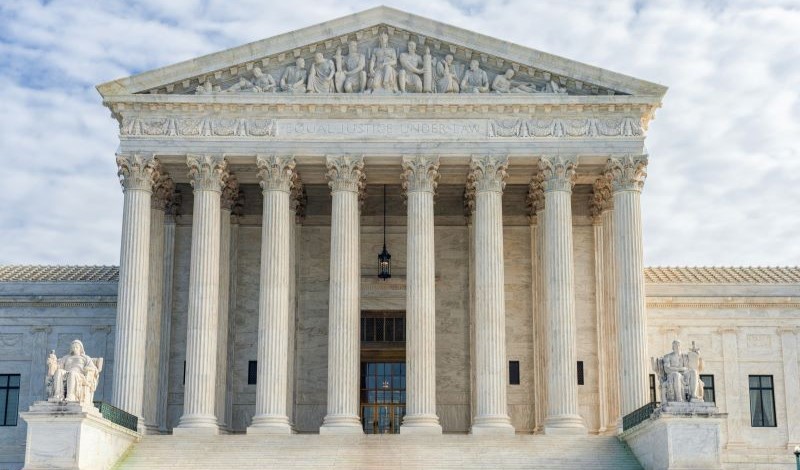
Reinvigorating nondelegation requires not just a reformulation of the doctrine, but also a willingness to apply it.
The U.S. Supreme Court has invalidated only two federal laws on nondelegation grounds, both times in 1935. The nondelegation doctrine has lain largely dormant ever since, prompting Cass Sunstein’s famous observation that the doctrine “has had one good year, and 211 bad ones (and counting).” This term, the Supreme Court has the chance to end the nondelegation doctrine’s losing streak, in FCC v. Consumers’ Research.
Members of the Court, led by Justice Neil Gorsuch, have in recent years expressed interest in reinvigorating the nondelegation doctrine by reformulating it. Whether the doctrine will actually begin to mean something, however, will depend not only on the Court’s ability to build a framework with more teeth, but also its willingness to begin deploying the doctrine with meaningful frequency.
The nondelegation doctrine is usually understood to prevent Congress’s delegations of its lawmaking authority to actors outside the legislative branch. Proponents of the doctrine hope that its reinvigoration will lead to the invalidation of many statutes that grant agencies authority. Such a reinvigoration could have dramatic consequences for American government. Expertise-based, technocratic decision-making—the kind that agencies engage in—might decrease, making room for a more empowered Congress. If it cannot delegate its authority, Congress might be spurred to make more laws itself.
When determining whether to invalidate a law on nondelegation grounds, the Supreme Court currently applies the “intelligible principle” test it established in its 1927 decision J.W. Hampton Jr. v. United States. This test is not considered demanding; it requires only that Congress provide some guidance to agencies—an intelligible principle—when it delegates authority to them.
Discussions of reinvigorating nondelegation have often focused on reformulating the doctrine—specifically, by replacing the weak intelligible principle test. In its 2019 decision Gundy v. United States, some members of the Court expressed interest in a reformulation. Although a plurality of the Court upheld the delegation at issue in Gundy, the dissent, authored by Justice Gorsuch, proposed a bolstered test. Much of the Court today is likely amenable to such a reformulation: Justice Clarence Thomas and Chief Justice John Roberts joined Justice Gorsuch’s dissent, and Justice Brett Kavanaugh, a probable supporter of a bolstered nondelegation doctrine, arrived on the Court after Gundy was argued.
The formulation Justice Gorsuch proposed would require that a delegation do no more than allow an agency to “fill up the details” left for it by a Congress that provided the agency with meaningful instructions, make factual determinations that affect the application of a law, or assume powers already constitutionally vested in the executive branch.
Replacing the intelligible principle test with Justice Gorsuch’s three factors or another more demanding test would be doctrinally significant. But if the Court’s goal is to limit the administrative state’s power by shifting lawmaking from agencies to Congress, the Court would need to also boldly and with meaningful frequency apply a strengthened doctrine.
Indeed, the nondelegation doctrine’s weakness is due in part to the Court’s failure to apply it at all since 1935. If the Court had applied it, there are some laws on the books with broad delegations that might not have survived, even under the lenient intelligible principle standard.
The Occupational Safety and Health Act is one such law. In a nondelegation challenge to the Act, a dissenting judge on the Court of Appeals for the Sixth Circuit noted that the Act grants the Secretary of Labor broad authority and imposes few restrictions. Namely, the Act allows the Secretary to fashion permanent occupational health and safety standards without requiring any preliminary factfinding or the occurrence of a particular situation to trigger the agency to act. The judge concluded that the Act’s grant of “nearly unfettered discretion” did not pass muster even under the intelligible principle test’s “minimal requirements.” The court’s majority, however, declined to find the statute unconstitutional. Other statutes, such as the Natural Gas Act and the Federal Power Act, contain the extremely broad instruction to agencies to make “just and reasonable” decisions. But those too have not been invalidated on nondelegation grounds.
Nondelegation doctrines in the states help illustrate that doctrinal formulations alone do not determine outcomes, and that willingness to deploy the doctrine is key.
Consider, for example, Florida, whose doctrinal formulation is strong. Despite this, agency authority in the state has not been significantly hampered. In addition to the intelligible principle test, Florida’s doctrine includes a prohibition on delegations that authorize agencies to decide when they can act, even if that determination is within their expertise. For example, the Florida Supreme Court invalidated a law delegating to the state’s environmental protection agency decision-making about geographic areas it would cover. But the court has not forcefully applied its stronger test to invalidate many laws. As a result, although Florida’s courts still invalidate more statutes than the federal Supreme Court, its administrative state remains alive and well.
Montana’s nondelegation doctrine, like Florida’s, is quite strong. Its test includes consideration not only of whether the legislature provided guidelines to an agency, but whether the guidelines are objective or leave room for the agency to exercise its judgement. If the guidelines are subjective, a Montana court might invalidate the delegation. Critically, however, Montana has also demonstrated a willingness to deploy its stronger doctrine; the state’s highest court has explained that although declining to do so “may be the trend under federal law and in some states, it is not Montana’s position.” The state’s attitude toward applying the doctrine matches the strength of its framework, and as a result, Montana has actually invalidated more laws on nondelegation grounds than most states.
In a study of state nondelegation doctrines, Daniel E. Walters found that the form of a state’s doctrinal test does not result in more or less invalidation of laws on nondelegation grounds. This is true even of states that adhere to aspects of the Gundy dissent’s more demanding test. Walters’s findings suggest that the courts’ willingness to deploy the doctrine, regardless of formulation, might be essential to a vigorous nondelegation doctrine.
Discussions of reinvigorating federal nondelegation have focused on a doctrinal formulation to replace the intelligible principle test. But if the nondelegation doctrine is reformulated at the federal level, its reinvigoration will not automatically follow. In addition to giving some teeth to the doctrine itself, the Supreme Court will have to begin applying the doctrine with an unprecedented frequency and force. Unless the Court does so, the administrative state may not look much different.



